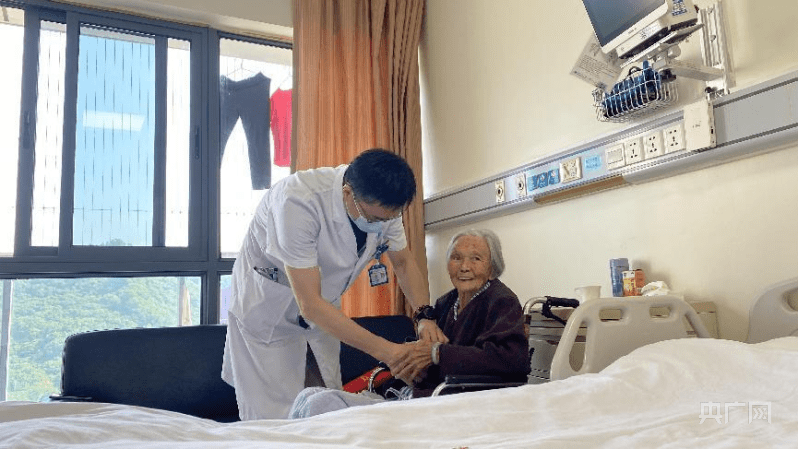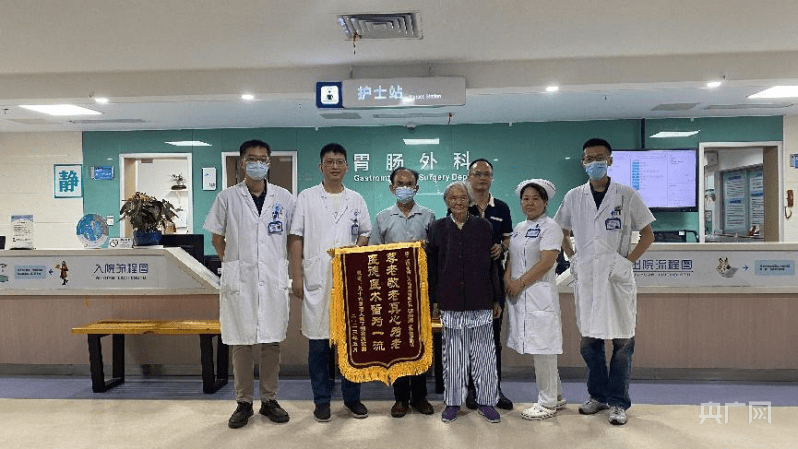Home >Technology peripherals >AI >Da Vinci robot completes minimally invasive colon cancer surgery for 96-year-old grandmother
Da Vinci robot completes minimally invasive colon cancer surgery for 96-year-old grandmother
- 王林forward
- 2023-06-02 19:50:151079browse
CCTV Shenzhen News on June 2 (Reporter Zhou Ziying) Exploration, separation, hemostasis, and suturing are all surgical actions that do not require the surgeon to stand in front of the operating table. They can be completed accurately by controlling the robotic arm through the console. . Recently, the surgical team of Zhang Haitao from the Gastrointestinal Surgery Department of Shenzhen Second People's Hospital, with the assistance of the da Vinci robot, performed radical surgery for ascending colon cancer on a 96-year-old grandmother. The patient recovered well and has been successfully discharged from the hospital.
Grandma Chen (pseudonym) is 96 years old this year. She began to have recurrent gastrointestinal bleeding two years ago. The doctor recommended gastrointestinal endoscopy. However, because of her age, heart disease and underlying diseases, her family has not made up her mind to undergo related examinations. During the examination, blood transfusion, hemostasis and symptomatic treatment were performed in an external hospital every time. In May this year, the team of Directors Zhang Haitao and Qin Ying of the Department of Gastrointestinal Surgery visited Grandma Chen. Through examination, they found that there was a tumor growing circumferentially in the ascending colon, which even an endoscope as thin as a finger could not pass through. It is understood that the ascending colon is the thickest part of the entire large intestine, and it can be seen that the tumor has seriously invaded the intestinal space. If the tumor is not removed, Grandma Chen's life will be seriously threatened.
But operating on a 96-year-old man was not easy. Due to the impact of the tumor, Grandma Chen was severely malnourished and anemic. During her hospitalization, her hemoglobin was at its lowest at only 46 grams. In order to make Grandma Chen's various indicators meet the surgical standards as soon as possible, the doctor placed a stent in the narrowest part of her intestine to temporarily open her intestines. Nutrition can be supplemented by eating, supplemented by intravenous infusion, and by slowing diarrhea. Prepare the bowel before surgery.
Director Qin Ying said that in order to minimize intraoperative blood loss and reduce the patient's anesthesia time, he and his family finally reached an agreement to choose the da Vinci surgical robot to perform the surgery on the patient. Compared with traditional laparoscopy, the surgical robot can directly view the three-dimensional space. The high-definition image can magnify the surgical image 10-15 times and see small blood vessels and tissues more clearly. The simulated wrist instrument has 7 degrees of freedom of rotation, which facilitates the doctor's operation and shortens the operation time. The control system can also Automatically filter out the tremor of human hands, making the control more stable and safer.

Doctor Qin Ying examines Grandma Chen’s wound (photo provided by Shenzhen Second People’s Hospital, distributed by CCTV)
Director Zhang Haitao introduced that the Da Vinci robotic surgical system is a complex that integrates a number of modern high-tech means and is known as the "revolutionary of the operating table." "Compared with traditional laparoscopic surgery, the advantages of the da Vinci robot are very obvious." During the operation, the surgeon is presented with a three-dimensional image, which also has a magnifying effect, allowing the surgeon to break through the boundaries of human hands, human eyes and space. It can perform more precise operations in a small space, perform more comprehensive and thorough resection of tumor tissue, and at the same time avoid damage to the nervous system and blood vessels to the greatest extent. In addition, the Da Vinci robot also has a filtering function that can filter out the physiological shaking of human hands, making the surgery more precise, safer, and more precise. While greatly improving the success rate of the surgery, it also greatly reduces the surgical trauma for the patient. So far, da Vinci robots have performed minimally invasive surgeries in the fields of urology, gastrointestinal surgery, hepatobiliary surgery, gynecology and thoracic surgery.
After the operation, Grandma Chen recovered very quickly and was able to walk within 24 hours. She was discharged from the hospital on June 1st. Grandma Chen and her family expressed their gratitude to the team of Director Zhang Haitao, Director Sun Dayong of the Department of Gastroenterology and Director Xiao Xiaohua of the Department of Geriatric Medicine. Full of praise. It was the skills and strength of Director Zhang Haitao's team that made the family determined to undergo the operation. The operation went very smoothly. Under the careful care of the medical and nursing team, Grandma Chen recovered quickly and was in better physical condition than before the operation. For this reason, Grandma Chen excitedly said that being discharged from the hospital on Children's Day meant that she had regained a new life. She specifically told her children to make a "red cloth" and give it to the treatment team to express their gratitude.
The development of da Vinci robotic surgery represents the pinnacle of minimally invasive surgery in the world, further creating the miracle of life and improving the patient's medical experience.

Grandma Chen’s family members presented the banner (Photo courtesy of Shenzhen Second People’s Hospital, distributed by CCTV)
The above is the detailed content of Da Vinci robot completes minimally invasive colon cancer surgery for 96-year-old grandmother. For more information, please follow other related articles on the PHP Chinese website!
Related articles
See more- Technology trends to watch in 2023
- How Artificial Intelligence is Bringing New Everyday Work to Data Center Teams
- Can artificial intelligence or automation solve the problem of low energy efficiency in buildings?
- OpenAI co-founder interviewed by Huang Renxun: GPT-4's reasoning capabilities have not yet reached expectations
- Microsoft's Bing surpasses Google in search traffic thanks to OpenAI technology

